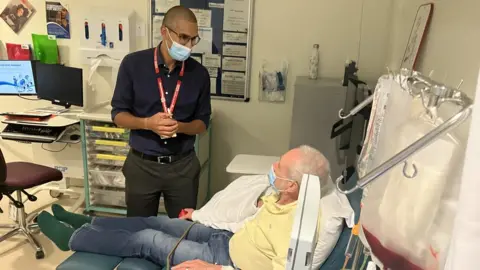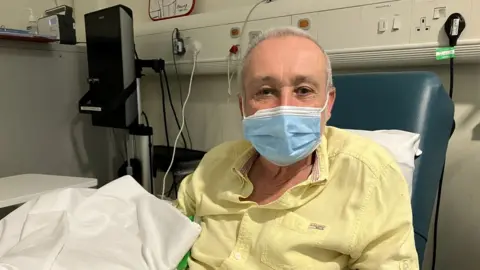New blood cancer treatment on offer for Nottingham patients
 BBC
BBCDozens of patients are in line to receive an innovative treatment for blood cancer in Nottingham.
Nottingham City Hospital is the first NHS centre in the East Midlands to provide CAR T-cell therapy.
Previously patients with the most common form of lymphoma diffuse large B cell lymphoma (DLBCL) had to travel to Birmingham, Leeds or London for the specialised form of immunotherapy.
The site expects to treat one patient on average every week.
'Quite important'
Lymphoma - one of more than 40 types of blood cancer - develops when white blood cells called lymphocytes grow out of control, and DLBCL is often an aggressive form of the disease.
Over five hours patients are connected to a machine that collects white blood cells containing T-cells from their bloodstream in a process called apheresis.
The cells are sent to a laboratory in the Netherlands, where the DNA of the T-cells is altered so it becomes a a CAR T-cell, which is sent back to Nottingham.
These cells are designed to recognise and selectively attack the cancerous cells, targeting a protein on the surface.
For 30 days after receiving the processed cells patients are required to live within a one-hour drive of the hospital centre delivering it in case of complications.

Stuart Downes, from Great Ponton in Lincolnshire, is one of the first people at Nottingham City Hospital to undergo CAR T-cell therapy, which costs about £100,000 per patient.
The 63-year-old, who was diagnosed last autumn with stage four cancer, previously had chemotherapy that failed to remove all of the cancer.
"I really hope it is successful or I may not be here this time next year, so it is quite important it works for me," he said.
"I think it is fantastic when you need modern medicine you realise how far it has come."
Nicolas Martinez-Calle, head of the new Nottingham CAR T-cell service and a consultant haematologist at Nottingham University Hospitals NHS Trust, said the treatment would help patients for whom chemotherapy does not work.
"CAR T-cell therapy is able to increase this probability of success and hopefully cure many of these patients," he said.
"This is probably the greatest service development we have done in haematology for several years and, it has taken a lot of hours of work by many people."

Follow BBC Nottingham on Facebook, on X, or on Instagram. Send your story ideas to [email protected] or via WhatsApp on 0808 100 2210.
